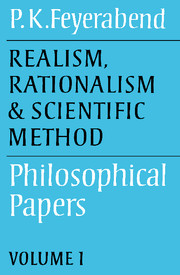Book contents
- Frontmatter
- Contents
- Introduction to volumes 1 and 2
- PART I ON THE INTERPRETATION OF SCIENTIFIC THEORIES
- 1 Introduction: scientific realism and philosophical realism
- 2 An attempt at a realistic interpretation of experience
- 3 On the interpretation of scientific theories
- 4 Explanation, reduction and empiricism
- 5 On the ‘meaning’ of scientific terms
- 6 Reply to criticism
- 7 Science without experience
- PART 2 APPLICATIONS AND CRITICISMS
- Sources
- Name index
- Subject index
5 - On the ‘meaning’ of scientific terms
Published online by Cambridge University Press: 05 June 2012
- Frontmatter
- Contents
- Introduction to volumes 1 and 2
- PART I ON THE INTERPRETATION OF SCIENTIFIC THEORIES
- 1 Introduction: scientific realism and philosophical realism
- 2 An attempt at a realistic interpretation of experience
- 3 On the interpretation of scientific theories
- 4 Explanation, reduction and empiricism
- 5 On the ‘meaning’ of scientific terms
- 6 Reply to criticism
- 7 Science without experience
- PART 2 APPLICATIONS AND CRITICISMS
- Sources
- Name index
- Subject index
Summary
1. In his criticism of Ryle, Hanson and me, Peter Achinstein notices ‘considerable oversimplification[s]’ and discusses ‘paradoxical consequences’ arising therefrom. He points out that meanings do not always change with the theory to which they belong and suggests the existence of ‘various kinds and degrees of dependence as well as independence’ between terms and theories. He believes that awareness of these different kinds and degrees will eliminate the paradoxes and support two assumptions he finds plausible, namely ‘(A) … it is possible to understand at least some terms employed in a … theory before (and hence without) learning the principles of that theory’; and ‘(B) It must be possible for two theories employing many of the same terms to be incompatible … And this presupposes that at least some of the common terms have the same meaning in both theories’.
This belief of Achinstein's seems to be refuted by the existence of pairs of theories that may be regarded as competitors and yet do not share any element of meaning. Attention to ‘various kinds and degrees of dependence’ clearly cannot eliminate such cases – it will rather bring them to the fore. Two examples exhibiting the property just described will be discussed in the next two sections. It will then be argued that, from the point of view of scientific progress, the examples are to be welcomed.
- Type
- Chapter
- Information
- Realism, Rationalism and Scientific MethodPhilosophical Papers, pp. 97 - 103Publisher: Cambridge University PressPrint publication year: 1981
- 6
- Cited by



